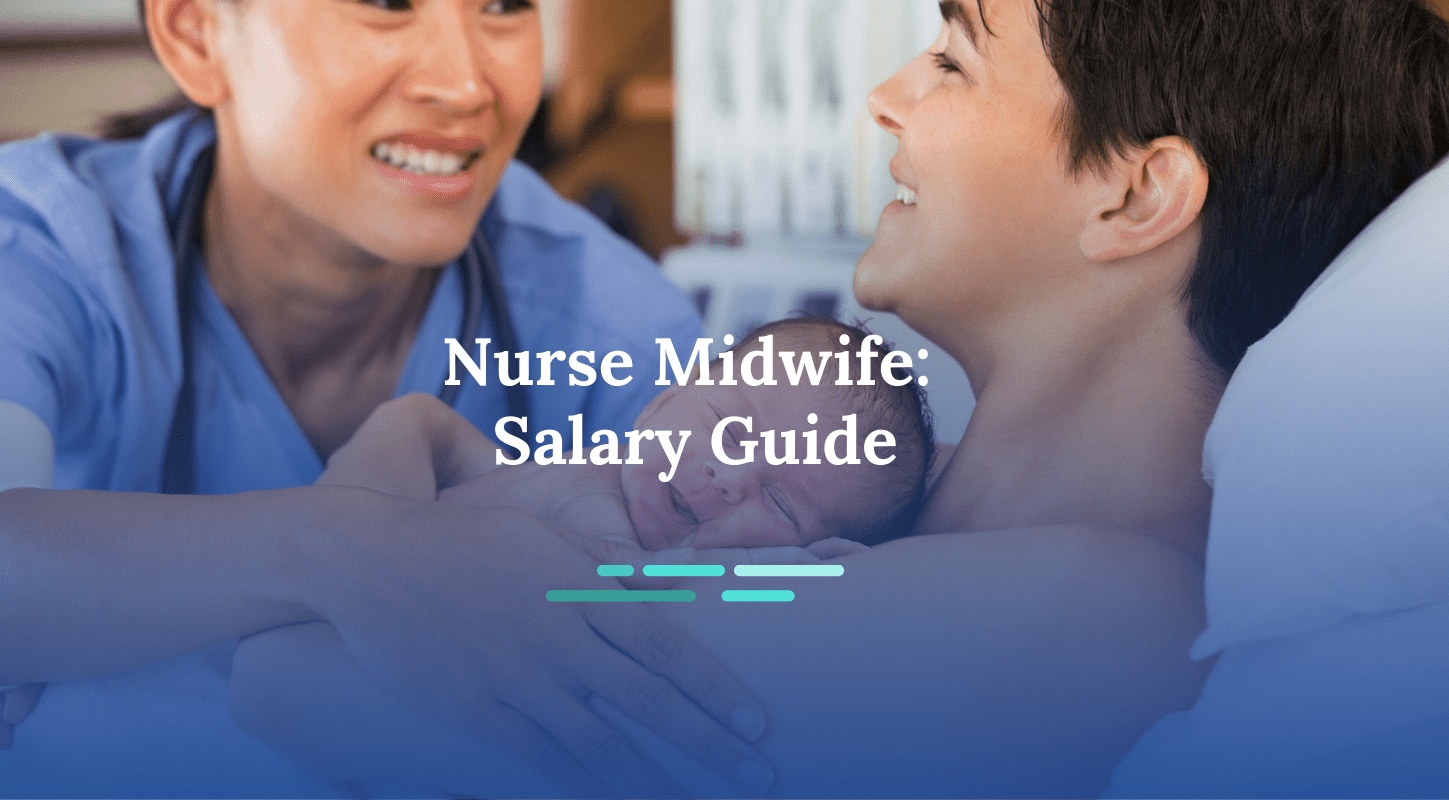How to Become a Nurse Midwife

Are you ready to earn your online nursing degree?
 Credit: pixelfit | E+ | Getty Images
Credit: pixelfit | E+ | Getty ImagesAre you thinking about a career as a nurse midwife? Use this guide to learn about different aspects of the profession, like common duties and certification requirements.
This page also details education requirements for midwife schooling, skills learned as a nurse midwife, and average program lengths.
What Is a Nurse Midwife?
Midwifery is a health profession that focuses on pregnancy, childbirth, and typically the first six weeks of postpartum. Expecting individuals often prefer to work with midwives as they can provide a more intimate experience.
For instance, some private-practice midwives can offer special services, including at-home births. Research shows that people who use midwife-led care also benefit from better health outcomes, fewer interventions, and higher levels of satisfaction.
Many midwives also work in birthing centers, obstetrician and gynecologist offices, and hospitals. Responsibilities include providing primary care for pregnant patients, performing physical exams, developing patient care plans, and educating people on birth options.
Steps to Becoming a Nurse Midwife
Students interested in learning how to become a nurse midwife must first hold a registered nurse (RN) license, which requires either an associate degree in nursing (ADN) or a bachelor of science in nursing (BSN) degree.
While an ADN is the minimum requirement to become an RN, a BSN is required to pursue advanced degrees. Students interested in advanced nurse midwife positions can earn a master of science in nursing (MSN) or doctoral degree to become a certified nurse midwife (CNM). CNMs are advanced practice registered nurses (APRNs).
The following section provides information on the length of each degree path, exam details, and licensing requirements.
A BSN is a four-year degree that develops students’ leadership skills and offers more opportunities than an associate degree. However, students interested in quickly launching their career may want to consider an ADN.
An ADN only requires two years of study and students qualify for a state license. Students with a bachelor’s degree or college experience in another field should consider an accelerated BSN, which can offer a quicker path to a nurse midwifery degree.
After graduating from a BSN program, aspiring midwives must pass the National Council Licensure Examination for RNs (NCLEX-RN) to begin working entry-level nursing positions. This exam includes four major categories and eight subcategories. The NCLEX uses variable question formats and may include up to 145 questions.
Most graduate-level nursing programs require at least 1-2 years of clinical experience before admission. Hands-on experience can aid in applications to competitive graduate programs.
Nurses often work as RNs before pursuing certified nurse midwife degrees and further licensure. This experience allows them to have a level of authority and expertise needed for advanced practice roles.
During this time, nurses can pursue additional certifications to prepare them for their future roles as CNMs. For instance, RNs can earn their neonatal intensive care nursing certification through the National Certification Corporation.
This credential, which strengthens nurses’ skills with newborn infants, requires one year of professional experience and passing an exam.
Students exploring midwifery should plan to earn their MSN in two years with full-time attendance, while part-time students may earn their degree in up to five years.
While an MSN is the minimum requirement for CNMs, students can go on to earn a doctor of nursing practice (DNP) in 3-4 years. Universities may also offer part-time options, which require up to seven years. A DNP allows students to target the population and issues they want to focus on.
Advanced nurse midwife schooling allows students to take a national certification exam for the nurse-midwifery specialty. National certification through the American Midwifery Certification Board (AMCB) indicates practitioners possess expert knowledge and skills to serve patients.
To qualify, students must earn their degree from a school accredited by the Accreditation Commission for Midwifery Education and hold an unencumbered RN license. CNMs need to apply for recertification every five years. Once nurse midwives pass their certification exam, they can apply for an APRN license in their state. Requirements for licensure vary by state.
RNs should consider their desired population to determine which facilities would best serve their career goals. The U.S. Bureau of Labor and Statistics (BLS) projects a 45% increase in demand for midwives from 2020-2030. However, students should consider factors that can make them stand out among the competition, such as credentials and experiences.
Nurse Midwife Schooling
The minimum degree requirement for certified nurse midwives is an MSN. Students should note that the amount of time it takes to become a nurse midwife depends on how much education and experience applicants hold.
The following sections outline admission requirements, coursework, and average program lengths.
BSN Degree
Students who want to become a midwife should begin with earning a BSN, which prepares graduates for an MSN. ADN graduates also qualify for an RN license. However, practitioners would need to consider alternative bridge programs to earn an MSN.
- Admission Requirements: 2.5 GPA; resume; essay; 2-3 letters of recommendation
- Program Curriculum: Courses may include fundamentals of caregiving and introductory science and math classes. Students must also complete clinical field experiences.
- Time to Complete: Four years with full-time attendance
- Skills Learned: Students learn to provide patient care to diverse communities and develop evidence-based practice, leadership, and management skills.
MSN Degree
An MSN is the minimum requirement to become a nurse midwife or CNM. Practitioners earn this degree to launch their midwife career as it requires less time than a DNP.
- Admission Requirements: 3.0 GPA; resume; three letters of recommendation; an RN license; some schools may ask for GRE scores
- Program Curriculum: MSN programs emphasize clinical leadership and patient advocacy. Courses may include gynecologic health, advanced pathophysiology and pharmacology, and healthcare ethics. Students must participate in clinicals to qualify for licensure.
- Time to Complete: Two years with full-time attendance (ADN-holders may qualify for accelerated bridge programs.)
- Skills Learned: Students build on their interpersonal communication, decision-making, and clinical leadership skills.
Doctor of Nursing Practice
To qualify for DNP programs, applicants must hold an MSN from an accredited institution. Some nurse midwifery programs allow students to complete their MSN and DNP in a bridge program where students can receive both a master’s and a doctorate in three years. Practitioners who earn a DNP establish a competitive advantage as subject-matter experts.
- Admission Requirements: 3.0 GPA at minimum; an unencumbered RN license; GRE scores; clinical experience with target population
- Program Curriculum: Goals include independently maintaining and restoring women’s health. Courses may include the science of healthcare delivery and clinical experiences.
- Time to Complete: Three years with full-time attendance
- Skills Learned: Graduates gain advanced clinical instruction and research methods for improving patient outcomes.
Nurse Midwife Credentials
Nurse midwife schooling leads to national certification and a state license, which indicates that CNMs meet the minimum requirements to practice. Graduates must also earn American Midwifery Certification through the AMCB, which shows employers and patients that the candidate possesses pertinent knowledge and skills in the area of midwifery. Once certified, CNMs can apply for state licensure.
Certifications
A certified nurse midwife must earn certification to legally practice midwifery. The AMCB offers the CNM credential and sets the minimum standards for practitioners in the midwifery field.
Aspiring CNMs must also possess clinical expertise. They must have competency in skills related to women’s health, providing reproductive care, assisting with delivery, caring for newborns, and treating sexually transmitted diseases.
Qualified applicants must also hold an advanced nursing degree from an accredited program and an unencumbered RN license. Applicants must complete a computer-based, four-hour exam at an approved testing site. The exam includes 175 multiple-choice questions.
Licensure
CNMs need two licenses at the state level: RN licensure and APRN licensure. RN licensure requirements by state vary as does APRN licensure.
An RN license requires each candidate to hold an associate or bachelor’s degree. Nurses hoping to gain advanced licensure should choose a bachelor’s degree, which they will need to enter graduate school.
States sometimes publish a list of accredited programs that include a comprehensive curriculum and the clinical hours that RN candidates need for licensure. Candidates also need to pass the NCLEX-RN. State nursing licensure boards usually require a background check and charge an application fee.
An aspiring CNM can apply for an APRN license after earning a graduate degree. They can either earn a master’s or a doctorate in nursing, and they should hold RN licensure. These nurses usually need a certification in a specialized area before qualifying for APRN licensure.
APRNs must get a state license to practice nurse midwifery. Students should review their state requirements when selecting schools as each state board of nursing establishes minimum standards. Applicants should begin with earning their AMCB certification and then apply for a certificate of authority. State requirements for the renewal process vary. For instance, some states may require renewal biennially on odd-numbered years.
Working as a Nurse Midwife
Students may want to consider building relationships during clinicals and field experiences as part of networking to help find jobs after nurse midwife schooling. Another strategy may include reaching out to practices prior to graduation or volunteering. BLS data shows that nurse midwives can earn $114,210 on average. However, students should explore average salaries in their state or county.
Hospitals (State, Local, and Private)
CNMs offer primary care for pregnant individuals, collaborate with physicians, and provide nonsurgical methods of family planning.
Birthing Centers
CNMs assist parents with labor, provide emotional support, and monitor people in labor for complications.
Public Health Clinics
CNMs reduce the rates of poor outcomes such as stillbirth and preterm birth. They can explore inequities in healthcare, such as how nurses can address disparities in infant mortality. They run initiatives to promote women’s health.
Becoming a Nurse Midwife: FAQ
What is the fastest path to becoming a nurse midwife?
The path to becoming a midwife depends on students’ level of education and experience. For instance, students just starting out may want to consider earning a BSN and then move on to an MSN, which requires about six years total with full-time attendance. BSN-holders only need to earn a MSN, which requires two years.
Why is it important that a nursing program be accredited?
Accrediting agencies set minimum standards for midwifery degrees. Employers, state nursing boards, and the AMCB use accreditations to determine if students possess the knowledge and skills to carry out their duties in the field. Students should also note that the AMCB requires applicants to hold a degree from an accredited school.
How much do nurse midwives make per hour?
Multiple factors can influence earning potential for midwives. Students may want to consider geographic location, workplace setting, education level, and experience. For instance, candidates with a DNP can command higher salaries than MSN candidates. However, nurse midwives earned $54.91 per hour on average as of May 2021, according to the BLS.
Is it hard to become a nurse midwife?
At minimum, students need to invest six years in their education. This field also requires hundreds of hours of field experiences. Additionally, students must pass licensing and certification exams. Practitioners interested in becoming experts in the field should plan to earn a DNP, requiring an additional 3-4 years of study.
Certified Nurse Midwife Resources
American College of Nurse-Midwives
As one of the most prominent professional associations for CNMs in the United States, ACNM supports experienced professionals and students alike. Members can attend events, participate in professional development opportunities, and meet their peers through volunteering.Midwives Alliance North America
This professional organization connects midwives all over North America, not just the United States. It offers several resources, like home birth transfer guidelines and a waterbirth guidance template.ACNM Career Center
ACNM runs an online career search engine with opportunities offered all around the country. Users can narrow their search by sector, discipline, location, and more.American Midwifery Certification Board
This organization offers certifications for midwives, CNMs, and professional midwives. Individuals can visit this website to answer their questions about the certification and renewal process.HiveCE
This organization offers plenty of ACNM-approved continuing education online courses. Professionals can access courses covering topics like newborn weight loss and how to prevent gestational diabetes.
Learn More About Nurse Midwives
Page last reviewed December 6, 2021
Are you ready to earn your online nursing degree?
Whether you’re looking to get your pre-licensure degree or taking the next step in your career, the education you need could be more affordable than you think. Find the right nursing program for you.








